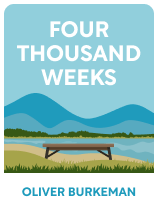

This article is an excerpt from the Shortform book guide to "Four Thousand Weeks" by Oliver Burkeman. Shortform has the world's best summaries and analyses of books you should be reading.
Like this article? Sign up for a free trial here .
What does it mean to “live life to the fullest”? Are you making the most of your life?
Let’s face it: Your life is finite and extremely brief in the context of the universe. If you live to be 76, you’ll only have about 4,000 weeks on Earth. The implication of a finite life is that you must use your time carefully and in service of projects and activities that matter to you and make you happy.
With that in mind, here’s how to live life to the fullest.
#1: Commit to Your Life Choices
Make and strongly commit to your life choices, insists Burkeman. As we just discussed, you’ll never be able to do everything you want in life, so it will make you happier to choose one option and do it well.
Burkeman elaborates that many people fear committing to choices because they think something better will come up if they keep their options open. However, this makes people unhappy because they constantly worry if there’s a superior alternative to what they’re doing, and it keeps them from experiencing the deeper joy of commitment.
For example, if you’re deciding between becoming a lawyer or a business owner, don’t spend years indecisively trying jobs in both fields or seeking jobs that give you the best of both worlds. Instead, commit to one career and dedicate yourself fully to being good at it. You’ll experience greater joy from being good at your work than from keeping your options open.
(Shortform note: In Stumbling on Happiness, Daniel Gilbert provides a scientific explanation of why you’re happier when you commit to a choice: You have a psychological happiness-protecting response. When something bad happens to you (a car accident, for instance), this response kicks in and allows you to feel happy—or at least less distressed—that it happened (you feel grateful that your kids weren’t in the car, for example). The same response kicks in when you make a firm commitment to a choice: Even if you’re not initially thrilled about that choice, the happiness-protecting response will allow you to become happy about it because you can no longer alter your circumstances.)
#2: Focus on the Present, Not the Future
As another solution to making the most of your limited time on earth, Burkeman suggests you focus on the only period of time you can completely control: the present. As discussed in Part 2, the delusion of control over your time encourages you to sacrifice your present time in service of improving your future time use. But because you can’t control the future, instead spend more time thinking about how you can make the most of the present.
For instance, if you’re tempted to spend your free afternoon preparing your business’s marketing campaign for next month rather than enjoying the nice weather, consider that you can guarantee your happiness now by going outside, but you can’t guarantee that your marketing campaign will be successful next month: Perhaps your competitors will lower their prices, and you’ll have to change the campaign to include a deal. You might thus opt to go outside, rather than work.
| How to Live Life to the Fullest: Ground Yourself in the Present Burkeman suggests that you should focus more on the present than the past or future because you can take action now to make the present better. However, others feel that you shouldn’t focus on existing merely in the present and instead balance living in the past, present, and future. In The Lucifer Effect, Philip Zimbardo argues that you should consciously apply a past-, present-, or future-oriented perspective depending on the situation you’re in. For example, when planning a trip, you should likely apply a future-oriented perspective to create an effective itinerary. However, if spending time with family, it’s better to be past-oriented, as your shared experiences will help you appreciate them more, and present-oriented, to better enjoy the moment.) |
#3: Incorporate Purposeless Time Into Your Schedule
To spend your limited time pursuing activities that matter to you, Burkeman advises intentionally incorporating purposeless time into your schedule. Purposeless time is time spent doing something you like to do for its own sake, which doesn’t promise a payoff. This could be a hobby or activity like reading or knitting.
(Shortform note: In Digital Minimalism, Cal Newport provides a counterpoint to Burkeman’s claim that you should pursue leisure activities that don’t promise a payoff. He claims that when you use your leisure time doing demanding activities with set goals, you feel accomplished and proud when you meet the goal. Perhaps a blend of both demanding leisure activities (like fixing a bike) and fully purposeless activities (like reading) might provide the greatest happiness.)
Incorporating purposeless time into your life keeps you from thinking exclusively about the future in a way that erodes your ability to enjoy the present, elaborates Burkeman. You refrain from orienting all your present pursuits toward a future outcome and instead orient yourself toward deriving the most enjoyment from the present.
(Shortform note: Mihaly Csikszentmihalyi’s Flow might provide additional context for why purposeless time keeps you rooted mentally in the present: Purposeless activities promote a “flow state.” Flow states are characterized by total absorption in and extended concentration on a task. Csikszentmihalyi adds that you feel happy when in a flow state because you have greater control over your thoughts and feelings than when not in flow.)
#4: Don’t Dedicate Your Time to Changing the World, Because You Can’t
Finally, refrain from trying to live your life in a grand, meaningful way because you will fail at this, asserts Burkeman. In the broader context of the universe, your life has very little significance, and you won’t be able to make long-lasting change. When you recognize this, you free yourself from the pressure of having to make a huge difference and can focus on making a difference in the smaller ways available to you, writes Burkeman. For example, you might simply visit your grandparents more frequently to bring them joy.
(Shortform note: The Tao Te Ching supplements Burkeman’s somewhat pessimistic assertion that you shouldn’t try to change the world with the advice to instead uncover what your specific function in the world is. It states that you don’t have the ability to improve the world because the world is in a state of sacred balance and order, referred to as the Tao. Any attempt to alter that order by “doing good” will fail. The best you can do is to understand what role the Tao needs you to play and then fulfill that role to the best of your abilities. This may involve simply performing small acts of generosity and kindness, as Burkeman recommends.)

———End of Preview———
Like what you just read? Read the rest of the world's best book summary and analysis of Oliver Burkeman's "Four Thousand Weeks" at Shortform .
Here's what you'll find in our full Four Thousand Weeks summary :
- Why humans will never have perfect control over how they spend their time
- Why you shouldn't feel guilty when you can't get everything done
- How to best use the finite amount of time you have on Earth






